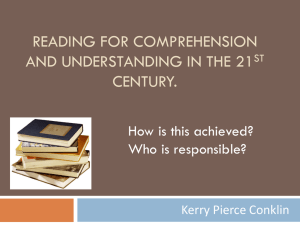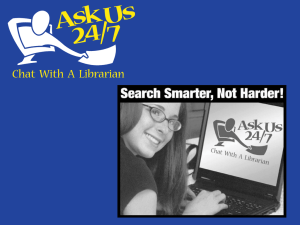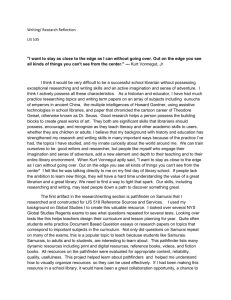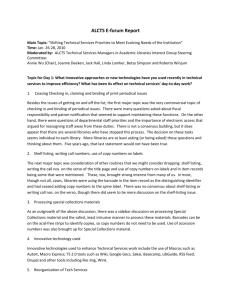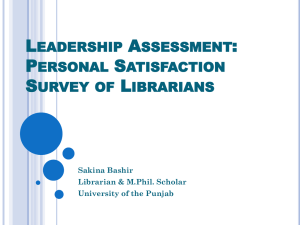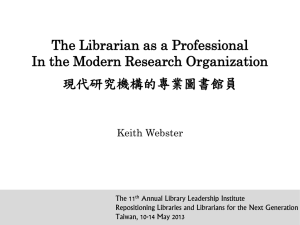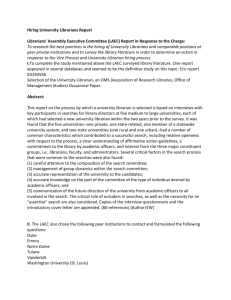ChanPark_TxSTEM2013_TipsForAFeralLibrarian
advertisement
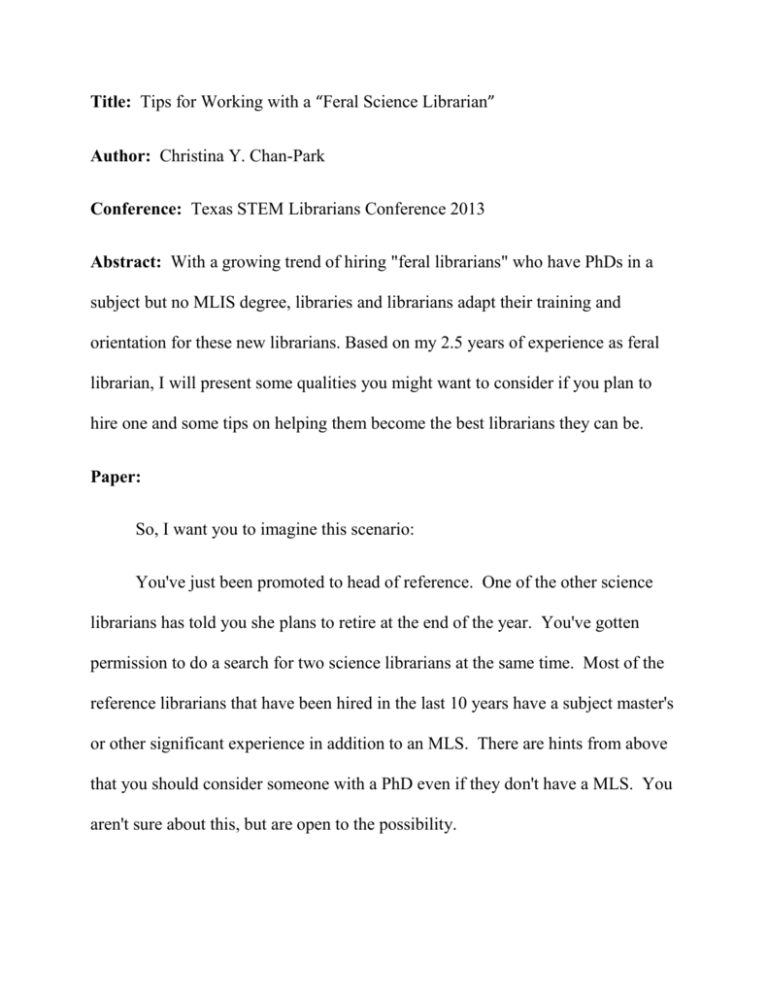
Title: Tips for Working with a “Feral Science Librarian” Author: Christina Y. Chan-Park Conference: Texas STEM Librarians Conference 2013 Abstract: With a growing trend of hiring "feral librarians" who have PhDs in a subject but no MLIS degree, libraries and librarians adapt their training and orientation for these new librarians. Based on my 2.5 years of experience as feral librarian, I will present some qualities you might want to consider if you plan to hire one and some tips on helping them become the best librarians they can be. Paper: So, I want you to imagine this scenario: You've just been promoted to head of reference. One of the other science librarians has told you she plans to retire at the end of the year. You've gotten permission to do a search for two science librarians at the same time. Most of the reference librarians that have been hired in the last 10 years have a subject master's or other significant experience in addition to an MLS. There are hints from above that you should consider someone with a PhD even if they don't have a MLS. You aren't sure about this, but are open to the possibility. Ten weeks later, you are in the midst of phone interviews. Included in the pool are three PhDs who don't have MLS degrees. The first one confirms your hesitation in hiring a PhD without an MLS. He clearly is only applying for the position because he can't find a tenure-track position in his discipline. You hear in his voice a disdain for the position, and he doesn't realize that at most research universities, librarians are considered faculty even if they're not tenure-track. There's no way you would want to work with this person. The second one seems better. She clearly has lots of experience helping students one-on-one and walking them through how to research. She even has grant experience with an REU program. But she doesn't seem to know anything out of her discipline nor show a willingness to venture out of it. Even when probed about how she would apply an experience to a different major or class, she falls back into the same pattern of talking about the area of her PhD. Working in your library, she would have to be a liaison to four departments, and you worry about her willingness to learn about and connect to these other departments The last non-MLS PhD actually seems promising much to your surprise. He doesn't have as much experience helping students one-on-one as the second applicant, but he did oversee a tutoring center for a bit. When he was an adjunct instructor he even brought his classes to the library for instruction. He doesn't have strong opinions on library issues but is aware of the open access movement, DMPs, and last year's brouhaha with ACS pricing even though he’s not a chemist. You sense that he is a constant learner and that he has characteristics that you would appreciate in any librarian in your group: a willingness to work hard and be flexible, good experience with teamwork and the desire to learn from mistakes. He’s not afraid to stop and ask questions and is willing to try and find answers. The committee wants to bring him to campus for an interview. It’s six months into the search, and the committee is trying to decide out of the six candidates who came to campus for an interview which ones to give offers to. The guy with the PhD is high on the list despite not having an MLS. Even the very traditional English and Medieval Studies librarian was impressed and put him on her yes list. The candidate’s presentation showed lots of preparation and a clear vision of how libraries play a role in the research process. The committee decides to offer jobs to him and another candidate who got a dual MLS and subject MS right after under completing undergrad. Now, it’s a month before fall semester starts and the new science librarians are on campus. As his supervisor, you’ve decided to mentor the new librarian who has a PhD but not an MLS. The other new science librarian is being mentored by the retiring science librarian. You wonder how to get him up to speed on libraries. You decide to start by teaching him about reference interviews. Because of his past experience, he seems to pick this up pretty quickly; he already knows that often when students ask a question it’s not the one they intended to ask and that you have ask them questions in order to help them. You point out a few databases for other science disciplines that he’s not familiar with, and he pretty quickly gains an understanding of these. The new science librarian has a notebook that he keeps with him to jot down what he’s been learning. One day you notice that he has a section where he keeps a list of acronyms. After a few weeks the list is quite long. When it comes to ordering books it takes him awhile to figure out that you use YBP, GOBI, and Baker & Taylor interchangeably and that you refer to them all as the jobber. He understands the difference between standing orders and approvals but doesn’t understand why you ask him to check the slips. The new librarian is comfortable using the online catalog and even caught on that the other librarians call it the OPAC. And he clearly sees the pros and cons of using a web-scale discovery system versus a subject database. But you realize trying to explain the back end of the ILS and MARC records is going to take more than just a few minutes. One day the link resolver breaks, and the new librarian sits in on a meeting to discuss how to fix it. You can see light bulbs going off as he figures out how openURL and crosswalks work. And clearly saying “metadata is data about data” is not going to be sufficient. It looks like you have your work cut out for you but it’s not so bad because he’s not shy about asking questions and is a willing learner. You notice that he relates to the faculty quite well and doesn’t even mind when they look down on him a little bit even though his academic pedigree is at least as good as theirs. The humanities and social science librarians feel that he’s a good addition to the team, and he takes interest in their projects as he tries to learn as much as he can about libraries. He even asks for a tour of the rarebook room and the off-site storage facility. He’s comfortable in the classroom and has a good sense of what students and researcher need to succeed. Although he’s still learning about libraries, overall you think you made the right choice.
